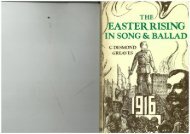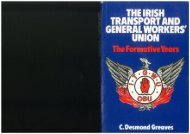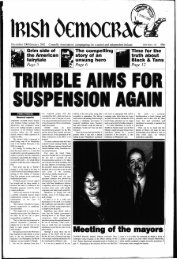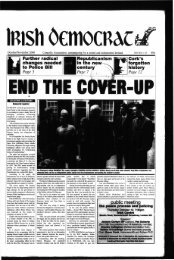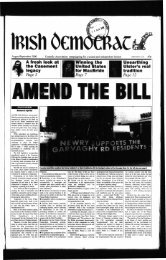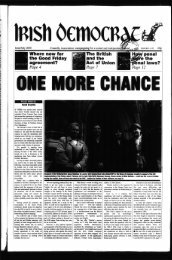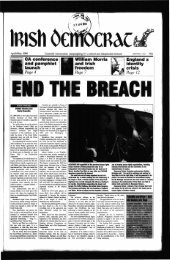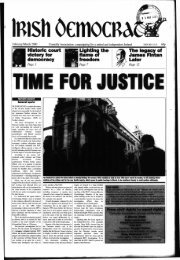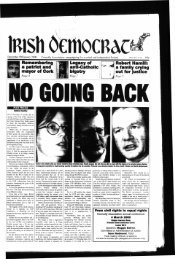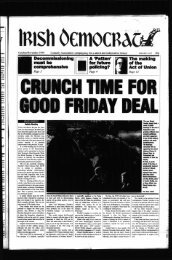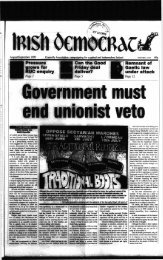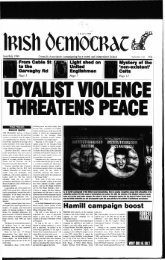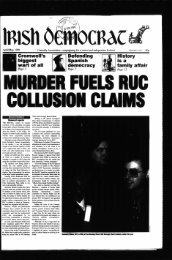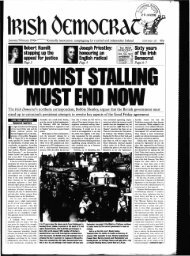Create successful ePaper yourself
Turn your PDF publications into a flip-book with our unique Google optimized e-Paper software.
• ii ii 1111114111ii«111111111111111 ii i • « »»i M111ii11111111111ii11111111111 M111111111111111111 •<br />
pili<br />
pit<br />
Suffragette, actress, revolutionary patriot: Were they a band of idealists determined to save the soul of the<br />
Constance Markiewicz was a remarkable nation by making a blood sacrifice? Or were they striking the first<br />
woman, often underestimated today blows of the still unfinished <strong>Irish</strong> revolution?<br />
111111111111111111M1111111111111111 • 111M11111111111 MI 111111111111111111111111111111111111 •<br />
E a s t e r R i s i n g 7 5 t h a nn I ¥ a r* a r y / r / a * <strong>Democrat</strong> s u p p l e m e n t<br />
N A iN;<br />
IRISHMEN AND IRISHWOMEN: lithe mm<br />
from which she receives her eM tradition of nationhood, Ireland, thrash ua. i<br />
her children to her flag end strikes for her freedom.<br />
Having organised and trained her manhood throngh her secret revolutionary<br />
organisation, the <strong>Irish</strong> Republican Brotherhood, and through her open military<br />
organisations, the <strong>Irish</strong> Volunteers and the <strong>Irish</strong> Citizen Army, having patiently<br />
perfected her discipline, ffhavug resolutely waited for the right meeMM to jtveal<br />
itself, she now seizes that moment, and, supported by her exiled children la America<br />
and hygallaat allies in Europe, but relying in the first on her own strength, eho<br />
strikes in tall confidence of victory.<br />
We decide the right of the people of Ireland to the ownership of Ireland, end to<br />
the unfettered control of <strong>Irish</strong> destinies, to be sovereign and Indefbitlhle The kmg<br />
.usurpation of that right by a foreign people and government hns not eztingnkhed tfcn<br />
right, noroan it ever be extinguished except by the destruction ef the <strong>Irish</strong> people, In<br />
every generation the <strong>Irish</strong> people have asserted their right to -ii^ii freedom and<br />
sovereignty: six times during the past three hundred years they have asscrUd it in<br />
arms. Standing on that fundamental right and again asserting it in nnasia the free<br />
of the world, we hereby proclaim the <strong>Irish</strong> Republic as a Sovereign Independent State,<br />
and wc pledge our lives and the lives of our comrades-in-arms to the of its freedom,<br />
of its welfere. and of its exaltati
T<br />
i> i) i> \ h r V l f * - t<br />
<strong>Easter</strong> RisLng 75th anniversary <strong>Irish</strong> <strong>Democrat</strong> supplement<br />
Myth of the blood sacrifice<br />
Into the quietly<br />
evolving affairs of<br />
an indifferent<br />
people leapt a band<br />
of idealists<br />
determined to save.<br />
the soul of the<br />
nation: that's the<br />
way the story goes.<br />
But unfortunately<br />
for the ideologues<br />
They rose in<br />
Galway<br />
WHEN Mellows got back from England to his<br />
headquarters in Killeeneen it was after Mac-<br />
Neill's countermand had thrown all the plans<br />
into confusion.<br />
Not of course that the failure of the arms landing<br />
in Kerry was of no moment. Those arms were badly<br />
needed in the west. The railwaymen were to run a<br />
special train while Volunteers kept the peelers busy.<br />
It was to skirt Limerick by die Ballysimon loop and<br />
drop arms for the insurgents at Limerick, Ennis, Gort,<br />
Athenry and as far as Tuam.<br />
The officers were in consultation in Mrs Walsh's<br />
kitchen when Pearse's order came. The Rising was on<br />
after all Padraig Fahy was sent to alert Gort and<br />
Kinvara. He was captured. The first engagement was<br />
therefore at Clarenbridge where a barricade was<br />
erected, the barracks attacked - but no rescue was<br />
effected as Fahy was taken not to Galway but to<br />
Limerick.<br />
Messengers had been sent in all directions. The<br />
insurgents first advanced on the city and caused consternation<br />
in the garrison and ascendancy classes.<br />
Meeting with some resistance they held Oranmore for<br />
a while, then moved east to the agricultural station<br />
just outside Athenry. There contingents from Athenry<br />
joined them. Tht peelers were shut up in the<br />
town.<br />
Soon it became clear that the whole of the south of<br />
the county had risen. The King's writ no longer ran<br />
over an area from Oranmore to Ballinasloe, from Gort<br />
to Tuam, an area of several hundred square mile. All<br />
the smaller police posts were evacuated and concentration<br />
made in the town In some places the police<br />
barricaded themselves in until after the Rising was<br />
over. This was, of course not the report they gave, and<br />
which was published in the official inquiry. They<br />
were great heroes in that.<br />
The insurgents were in Moyode for most of the<br />
week, an old evacuated mansion beside an ancient<br />
castle. There had been a great prehistoric battle near<br />
by; and Sarsfield had come this way on his ride south.<br />
There field kitchens were set up and onions and<br />
potatoes donated by the farmers, bubbled appetisingly<br />
with die hindquarters of bullocks seized from the<br />
local landlords.<br />
Several attempts were made by the British to engage<br />
them. A train of artillery left Ballinasloe, but<br />
turned back. A gunboat did some badly wide shelling<br />
from Galway Bay. The authorities did not know how<br />
many men Mellows had, and they knew the object<br />
would be to advance to the Shannon and keep reinforcements<br />
from Athlone going to Dublin.<br />
Even isolated in Galway, his presence did just that.<br />
There was no surrender in Galway. When it was clear<br />
that Dublin was lost, the men dispersed to their<br />
homes and hid their arms. There were of course hundreds<br />
of arrests. But all lived to fight another day -<br />
with great effect. Mellows and two companions went<br />
on the run in the Aughty mountains, ultimately<br />
months later, making for Limerick and freedom.<br />
• Reprinted from <strong>Irish</strong> <strong>Democrat</strong>, April 1966<br />
The Foggy Dew<br />
AS DOWN the glen one <strong>Easter</strong> morn toa city fair rode I,<br />
Three armed lines of inarching men in tqaadrons passed me by;<br />
No pie did hum, no battle drum did sound its loud tattoo,<br />
But the Angelus bell o'er the Liffey swell rang out through the foggy de<br />
Right proudly high over Dublin town they hung out the flag of war;<br />
It was better to die 'neath an <strong>Irish</strong> sky than at Suvla or Sud-el-Bar;<br />
And from the plains of Royal Meath strong men came hurrying through,<br />
While Britannia's Huns, with their six-inch guns, sailed in through tne<br />
foggy dew.<br />
Oh the night fell black and the rifle's crack made perfidious Albion reel,<br />
'Mid the leaden rain seven tongues of flame did shine o'er the lines of<br />
steel;<br />
By each shining blade a prayer was said that to Ireland her sons be true<br />
And when morning broke still the war flag shook out its folds through<br />
the foggy dew.<br />
'Twas England bade our Wild Geese go that small nations might be free,<br />
But their lonely graves are by Suvla's waves or the fringe of the great<br />
North Sea;<br />
Oh had they died by Pearse's side, or had fought with Cathal Brugha,<br />
Their names we'd keep where the Fenians sleep, 'neath the shroud of the<br />
foggy dew.<br />
But the bravest fell and the requiem bell rang mournfully and clear<br />
For those who died at <strong>Easter</strong>tide in the springtime of the year,<br />
While the world did gaze with deep amaze, at those fearless men but few<br />
Who bore the fight that freedom's light might shine through the foggy<br />
dew.<br />
Back through the glen I rode again, and my heart with grief was sore,<br />
For I parted then with valiant men whom I never shall see more;<br />
But to and fro in my dreams I go, and I kneel and pray for you.<br />
For slavery fled, oh glorious dead, when you fell in the foggy dew.<br />
• REV. P O'NEILL<br />
establishment, the<br />
facts just don't<br />
hear it out<br />
TWO MYTHS are widely held<br />
about 1916. The first is that<br />
the Rising was not a serious<br />
military effort, but a hopeless<br />
blood sacrifice which<br />
then in some mysterious way secured<br />
<strong>Irish</strong> independence. The<br />
second is that the <strong>Irish</strong> people were<br />
totally opposed to the Rising and that<br />
without the executions little more<br />
would have been heard of the insurgents<br />
The blood sacrifice notion is the<br />
myth of origin of the later Tree<br />
State', covering part of a partitioned<br />
country and politically dominated<br />
by a conservative middle-class establishment<br />
that nowadays favours<br />
abandoning such independence 'as*<br />
had been won to become a province<br />
in a Brussels-run European Uni&te^i,<br />
The story is roughly that into-the;<br />
quietly evolving affairs of a con-;<br />
tented or indifferent people<br />
suicidal band of revolutionaryidealists<br />
determined to save the soul of<br />
the nation through a blood sacrifice.<br />
They aroused not enthusiasm but<br />
hostility and forfeited their lives. But<br />
then "a terrible beauty was born".<br />
All that was unchanged by the Rising<br />
was "changed utterly" by the<br />
executions, as the great myth-maker<br />
Yeats put it. Thus from the British<br />
point of view, General Maxwell's<br />
reign of terror was an unforgivable<br />
blunder. From the <strong>Irish</strong>, it was the<br />
justification of the blood sacrifice.<br />
What are the facts? The promised<br />
Home Rule Act had been passed, but<br />
with solemn humbug it was put<br />
"into suspension" for the duration of<br />
the 1914-18 World War. It would<br />
then take another Act when the War<br />
was over to take it out of suspension,<br />
when it was clear that Home Rule<br />
then would be for a partitioned Ire:<br />
land. The middle-class leaders of the<br />
Home Rule Party, Redmond and<br />
Dillon, had given every indication<br />
that they would accept partition<br />
after the War. Redmond urged the<br />
<strong>Irish</strong> Volunteers to join the British<br />
Army, which thousands did arid"<br />
went abroad to Flanders to be<br />
slaughtered for nothing.<br />
At the time of the <strong>Easter</strong> Rising,<br />
the British Cabinet was meeting to<br />
decide whether Britain should carry<br />
on the war or not. True, the insurgents<br />
did not know this, but it was<br />
common knowledge that something<br />
of the kind was afoot. If the War had<br />
.ended in 1916 with a German victory,<br />
which seemed possible, or a<br />
negotiated peace, a functioning administration<br />
in Dublin might have<br />
succeeded in claiming recognition at<br />
fee peace conference. Alternatively,<br />
wi English neutralisation of Ireland<br />
^as part of a deal with America to<br />
bring the US into the war was quite<br />
thinkable to people at the time.<br />
B!<br />
UT THE German arms landing<br />
failed, and in any case was not<br />
big enough. Germany did not<br />
regard the <strong>Irish</strong> struggle sufficiently,<br />
seriously. But that factors its leaders<br />
knew nothing of at the time made the<br />
Rising premature was quite a different<br />
thing from turning it into a hopeless<br />
attempt at martyrdom. Looking<br />
back it is easy to say that if the Rising<br />
had not occurred until 1918, when<br />
the whole of Ireland was aroused by<br />
the threat of conscription, the chances<br />
of military success might have<br />
been greater. Even in relation to such<br />
a possibility it is foolish to dogmatise,<br />
for lots of other things also would<br />
have been different by then. Unlike<br />
us looking back, the 1916 men could<br />
not see forward to 1918. Neither<br />
could they foresee the failure of the<br />
German arms landing nor the effects<br />
of Eoin MacNeill's countermanding<br />
order, which threw into confusion all<br />
for the Rising. In the cirit<br />
was a remarkable mili-<br />
tary achievemertt that the insurgents<br />
were able to hold Dublin for a week.<br />
The "blood 1 sacrifice" notion<br />
relies a lot on some pieces of rhetoric<br />
by Patrick Pearse, taken completely<br />
out of context. Pearse was by no<br />
means the lonely central figure the<br />
myth-makers like to allege him to be.<br />
He did not become a member of the<br />
IRB until the end of 1913, though<br />
that organisation had aimed at<br />
bringing about another Rising for<br />
nearly half a century since the previous<br />
Fenian one in the 1860s. The<br />
principal IRB<br />
leaders, Tom<br />
Clarke and Sean<br />
MacDiarniada,<br />
were far from being<br />
seekers after martyrdom.<br />
As for<br />
Connolly, when'the<br />
1914 War broke out<br />
he described the<br />
tactics to be<br />
adopted by the<br />
united movement<br />
of workers and the<br />
small middle class<br />
that came together<br />
in the Rising in<br />
terms very different<br />
from the supposed<br />
blood sacrifice: -<br />
"The Germans are in Boulogne<br />
where Napoleon projected an invasion<br />
of Britain. To Ireland it is only a<br />
12-hour run. If you are itching for a<br />
rifle, itching to fight, have a country<br />
of your own. Better to fight for our<br />
own country than for the robber empire<br />
.... Starting thus,Ireland may<br />
light a fire which will not burn out<br />
till the last capitalist bond and<br />
debenture will-burn to ashes on the<br />
grave of the last war lord."<br />
Regarding public attitudes to the<br />
'1916<br />
symbolises<br />
unfinished<br />
business - the<br />
unfinished<br />
business of the<br />
<strong>Irish</strong><br />
revolution'<br />
Rising, usually the people quoted<br />
were those of the upper or middle<br />
class who were opposed to it and<br />
wrote their views in the newspapers.<br />
It would have been a bold man in<br />
Dublin who stood up to be counted<br />
in favour of the insurgents when a<br />
thousand and more were being arrested<br />
and hundreds more were<br />
taken away to internment in Britain.<br />
Everybody likely to be suspect<br />
would be singing in a very low key.<br />
Even so there is plenty of evidence<br />
of support for the Rising, from<br />
the old women<br />
who complimented<br />
"the poor boys"<br />
when they saw the<br />
prisoners, to the<br />
farming people<br />
who hailed the participants<br />
in the<br />
Battle of Ashbourne<br />
as heroes.<br />
The way the farmers<br />
of County<br />
Galway handed<br />
over their potatoes<br />
and onions to the<br />
field camp of Liam<br />
Mellows when they<br />
saw rump steaks<br />
from landlords'<br />
bullocks bubbling up as <strong>Irish</strong> stew,<br />
tells its own story.<br />
Of course, the well-dressed and<br />
over-fed snobs of contemporary<br />
Grafton Street and every pensioner<br />
and hope-for-a-pensioner in Dublin<br />
condemned it. But can anybody seriously<br />
believe that the workers who<br />
had been out eight months with<br />
Connolly in the Great Lockout<br />
which ended only two years previously<br />
were now completely<br />
oblivious of what he stood for?<br />
The <strong>Irish</strong> people may not have<br />
immediately understood what the<br />
Rising was. It took them by surprise.<br />
But they were rapidly enlightened as<br />
a result of the executions. If they had<br />
not been enlightened by the executions,<br />
they would have been<br />
enlightened by the imprisonments<br />
which took their place, or otherwise<br />
by the insurgents themselves.<br />
The Rising was the first passage<br />
of arms of a national revolution, and<br />
national revolutions arise from the<br />
need of a nation to be free, not from<br />
the blood sacrifice of individuals.<br />
1916 symbolises the unfinished<br />
business of the <strong>Irish</strong> revolution. That<br />
is why commemorating it is such a<br />
sensitive issue to the <strong>Irish</strong> powersthat-be.<br />
It is why Government<br />
celebrations on the 75th anniversary<br />
are but a shadow of the celebrations<br />
for the 50th. It is why it took die<br />
work,of a voluntary group, theSpirit<br />
of <strong>Easter</strong> Committee, to shame Taoiseach<br />
Haughey into holding some<br />
form of State ceremony at the GPO<br />
on <strong>Easter</strong> Sunday.<br />
The present-day Republic of Ireland<br />
is not the Republic of the<br />
Proclamation of 1916, a Republic<br />
that Pearse, Connolly and the others<br />
saw as being a beacon for the poor<br />
and oppressed of every land. It has<br />
its origin rather in the defeat of that<br />
Republic, in the failure of organised<br />
Labour to stand by it in 1916-20, in<br />
the counter-revolution of 1921-22,<br />
the defeat of the Republicans in the<br />
Civil War and the rise to power of<br />
die <strong>Irish</strong> business and commercial<br />
classes who today rattle die begging<br />
bowl in Brussels to get the highest<br />
price possible for selling their<br />
country. The difference between<br />
those two Republics is the measure<br />
of the unfinished business still before<br />
us.<br />
Suffragette, actress, revolutionary<br />
patriot: Constance Markiewicz was a<br />
remarkable woman, often -<br />
underestimated today.<br />
ANNE HAVERTY argues that's a<br />
serious mistake<br />
Battle Hymn of the<br />
<strong>Irish</strong> Republic<br />
ARMED FOR the battle, kneel<br />
we before Thee,<br />
Bless Thou our banners, God of<br />
the brave!<br />
Ireland is living! shout we exultant;<br />
Ireland is waking! hands grasp<br />
the sword.<br />
Who fights for Ireland, God<br />
guide his blows home;<br />
Who dies for Ireland, God give<br />
him peace!<br />
knowing our cause just, march<br />
we triumphant,<br />
Living or dying, Ireland to free!<br />
The spirit of freedom floats in<br />
the ether<br />
Souls of our heroes march by our<br />
side.<br />
Tone is our battle-cry, Emmet inwm*.<br />
Those who for freedom fall shall<br />
never die.<br />
England is breaking! shout we exultant;<br />
England is beaten, Ireland is free!<br />
Charge for the old cause, down<br />
with the old foe,<br />
Giving our heart's blood, Ireland<br />
ttml<br />
• CONSTANCE<br />
MARKIEVICZ<br />
THE extraordinary woman<br />
that Constance Markiewicz<br />
was is often underestimated<br />
today. Some share Sean<br />
OCasey's attitude that she<br />
was a dilettante who took up politics<br />
as a means of walking into the limelight,<br />
someone who wasn't quite<br />
serious enough.<br />
And in its bare bones her story<br />
does belong to the pages of romantic<br />
fiction - the beautiful aristocratic<br />
headstrong girl who rides fast horses<br />
over die hedges and ditches of<br />
her father's thousands of acres and<br />
then turns to conspiracy and revolution.<br />
Her soldierly role in the<br />
Rising and its aftermath can, given<br />
our modern soul-searchings about<br />
the recourse to arms in 1916, make<br />
her seem belligerent; and this especially<br />
since she was a woman. Her<br />
different vocations, artist, actress,<br />
polemicist and politician, reveal, it is<br />
suggested, not her commitment, but<br />
is opposite. Even her achievements<br />
are nekl against her. They are seen as<br />
obscuring the achievements of the<br />
many other women of the time who<br />
had a less public part than she had<br />
and are now forgotten. She has had,<br />
it is sometimes Said, more than<br />
enough attention already.<br />
Bift Constance Markiewicz did<br />
not have it so easy as might be imagined.<br />
Always uneasy with her<br />
social position and the constrictions<br />
it imposed, she had to fight for die<br />
•The <strong>Irish</strong> Citizen Army, which Constance Markiewicz helped found, at Croydon House, Croydon Parte, 1915<br />
right to be an artist as she wanted to<br />
be and was 25 before she Was finally<br />
able to go to London to study, and<br />
live with some independence. Later,<br />
studying in Paris, she held out on<br />
two francs a day, because of a family<br />
strategy to force her back to Lissadell.<br />
This persistence and<br />
determination to take the unconventional<br />
and unpopular path stayed<br />
with her throughout her life.<br />
The long list of bodies she was<br />
involved with, often as a founding<br />
member - the Suffragettes, Inine na<br />
hEijreann, the National Theatre, the<br />
Fianna, Sinn F«n, the Citizen Army,<br />
the Provisional Government, Cumann<br />
na mBan, Fianna FAil - show<br />
her commitment. For 20 years, until<br />
her death in 1927, it was this that led<br />
her from one badly-lit hall to another<br />
to attend those contentious meetings<br />
which she really did not enjoy. And<br />
these were interspersed with gruelling<br />
terms in prisons in England and<br />
Ireland.<br />
She was committed to a vision of<br />
a new Ireland; independent, <strong>Irish</strong>,<br />
equal and just. When, in the '20s, this<br />
vision seemed less and less lie likely<br />
to materialise, she did not lose her<br />
spirit but went on hoping and working.<br />
All her talents were devoted to<br />
this hope. Her clever and incisive<br />
writings were polemical but not theoretical.<br />
The happiness and welfare<br />
of people was her primary motivation.<br />
When she founded the Fianna,<br />
she was as interested in giving boys<br />
who lived in the dreariness of poverty<br />
a respite from it as she was in<br />
training them to be soldiers. Later,<br />
when old people had no coal in a<br />
hard winter because of a strike, she<br />
would throw theory aside and bring<br />
aid to them herself.<br />
Her obvious achievements - the<br />
first woman to be elected to the British<br />
Parliament, first woman minister<br />
in government, her refusal to be fettered<br />
by the limitations of being a<br />
woman - are important. But it was<br />
her human qualities that made her<br />
unique and eared her the love of<br />
thousands of people. Her great<br />
generosity, her courage, her total<br />
and spirited engagement in the life<br />
of her time, make all grudging views<br />
of her misplaced.<br />
II Reprinted from An Chdisc 1916,<br />
Mardi <strong>1991</strong>, newsletter of the Reclaim<br />
the Spirit of <strong>Easter</strong> 1916 Festival
<strong>Easter</strong> Rising 75th an niversary <strong>Irish</strong> <strong>Democrat</strong> supplement<br />
<strong>Easter</strong>'s red-gold flame<br />
REASONS WHY<br />
YOU SHOULD JOIN<br />
The <strong>Irish</strong> Citizen Army.<br />
BECAUSE It pledges its members to work for,<br />
organise for, drill for and fight for an Independent<br />
Ireland.<br />
BECAUSE It places its reliance upon the only class<br />
that never betrayed Ireland—the <strong>Irish</strong> Working<br />
Class.<br />
BECAUSE Having a 4«Tir,ite aim to work for there<br />
is no fear of h aeinj paralysed in the moment of<br />
action by divisions in its Executive Body.<br />
BECAUSE It teaches that "the sole right of ownership<br />
of Ireland is rested in the people of Ireland,<br />
and that that full right of ownership may, and<br />
ought to be, enforced bv any and all means that<br />
(Jod hath put within the pwer of man."<br />
BECAUSE It works in harmony with the Labour<br />
and true National Movements and thus embraces<br />
all that- makos for Social Welfare and National<br />
Dignity.<br />
Companies Wanted in Every District.<br />
RECRUITS \\*ANTED EVERY<br />
HOUR.<br />
Apply for further information, Secretary, Citizen Army,<br />
Liberty Kail, Dublin.<br />
<strong>Irish</strong> Pjfitr] Citv I'rintlftg Works, rj Stafford Sir ft/, Dublin.<br />
Recruiting leaflet of the Citizen Army<br />
Horo, so do<br />
bheatha abhaile!<br />
CURFA:<br />
Horo! Se do bheatha abhaile! .<br />
Horo! Se do bheatha abhaile!<br />
Horo! Se do bheatha abhaile!<br />
Anois ar theacht an tsamhraidh!<br />
Se do bheatha! a bhean ba<br />
leanmhar!<br />
Le ar gcreach tu bheith i<br />
ngeibhinn,<br />
Do dhuithche bhrea bheith i<br />
seibish meirleach<br />
Is tu diolta leis na Ghallaibh.<br />
Ta Grainne Mhaol a' teacht thar<br />
saile,<br />
Oglaigh armtha lei mar gharda;<br />
Gaeil iad fhein's ni Gaill na<br />
Spanigh,<br />
Is cuifidh siad ruaig ar<br />
Ghallaigh.<br />
A bhui le Dia na bhefeart go<br />
bhfeiceam,<br />
Muna beo 'na dhiaidh ach<br />
seafhtain,<br />
Grainne Mhaol agus mile<br />
gaiscioch<br />
A' fogairt fain ar Ghaalaigh.<br />
PADRAIG MAC<br />
PIARAIS<br />
IRISH DEMOCRAT April <strong>1991</strong> iv<br />
• From pi<br />
the Unionists were held. The Protestant<br />
<strong>Irish</strong> Churchman then made no<br />
secret of the fact that if Home Rule<br />
was allowed, "a powerful continental<br />
monarch" (guess who?) "is prepared<br />
to send an army sufficient to<br />
release England of any further<br />
trouble in Ireland by attaching it to<br />
his dominions".<br />
So much for the pretence of 'Loyalism'<br />
to the English Crown and<br />
State.<br />
So much for the 'constitutional'<br />
and 'democratic' process for the<br />
<strong>Irish</strong> nation. Fifty years of taking<br />
part in the constitutional process<br />
had proved futile. It was clear that<br />
Britannia waived the rules every<br />
time it suited her interests. This realisation<br />
made the 1916 uprising<br />
inevitable.<br />
During the week of fighting,<br />
mostly confined to Dublin, the official<br />
casualty figure is given as 1,351<br />
people killed or wounded. However,<br />
casualty figures have varied.<br />
The Canadian reporter, F. A. McKenzie,<br />
estimated civilian casualties at<br />
close to a thousand while British soldiers<br />
and police killed or wounded<br />
was over 500. "The official estimates<br />
are, I am aware, much less, but I<br />
have yet found little reason to alter<br />
my original figure". At the time<br />
General Maxwell gave out figures of<br />
136 British troops dead and 216 civilians.<br />
Insurgents were given at 56<br />
dead. A.V. Sell wood, writing from<br />
the British viewpoint, gave figures<br />
of 600 soldiers, 300 insurgents and<br />
450 civilians dead with a total 3,000<br />
dead or wounded. Edward Norman<br />
gives 103 soldiers and 450 "rebels<br />
and civilians".<br />
The insurrection was crushed<br />
and the systematic execution of the<br />
leaders by firing squad began. There<br />
were 15 executions by firing squad<br />
and the execution by hanging in<br />
England of Roger Casement. 160 appeared<br />
before courts martial with 90<br />
sentenced to death. After the 15 executions,<br />
the sentences were<br />
committed to penal servitude for<br />
life. Only 11 were acquitted. A further<br />
1,841 were<br />
interned without<br />
trial at a special<br />
camp at Frongoch<br />
in north Wales.<br />
It might concentrate<br />
our minds<br />
to remember what<br />
the <strong>Irish</strong> Catholic<br />
Church and its<br />
leaders thought of<br />
the event. In tht<br />
May 29, 1916,<br />
issue, the <strong>Irish</strong><br />
Catholic, reflecting<br />
the Hierarchy opinion,<br />
wrote, in the<br />
wake of the execution'of<br />
the leaders:<br />
"What was attempted<br />
was an act<br />
of brigandage<br />
pure and simpleno<br />
reason to lament that its perpetrators<br />
have met the fate universally<br />
reserved for traitors."<br />
There was little of the New Testament<br />
spirit in the columns of the <strong>Irish</strong><br />
Catholic.<br />
Almost from the start there was a<br />
tendency to obscure the real issues of<br />
the uprising and those concerned in<br />
it, particularly there was a tendency<br />
to misrepresent the attitudes of<br />
Pearse and Connolly. Most readers<br />
will know how Connolly's rdle was<br />
met with almost total incomprehension<br />
by Socialists in England and<br />
Se5n G'Casey (quite cynically, I<br />
would maintain) added to their misunderstanding<br />
by claiming that<br />
Connolly had stepped from "the<br />
narrow by-ways of <strong>Irish</strong> socialism"<br />
to "the crowded highways of <strong>Irish</strong><br />
nationalism". Further, O'Casey<br />
maintained that Connolly had<br />
turned from the "higher creed of international<br />
humanity".<br />
Ignoring the continuity of Connolly's<br />
thought, so clearly and<br />
concisely expressed in his writings,<br />
of which, most sadly no complete<br />
collected edition has ever been made<br />
(to the shame of the state which genuflects<br />
to him as a founding father),<br />
Connolly was systematically character<br />
assassinated even in the hours<br />
while he stoically awaited the British<br />
firing squad. Myth upon myth has<br />
been piled up around Connolly, dispelled<br />
by Desmond Greaves' classic<br />
study of Connolly's life and work.<br />
In view of the Greaves' book<br />
(which I exhort all readers to study)<br />
I shall say little about the de-mytho-<br />
Iogising of Connolly. However,<br />
Connolly's comrade Pearse has been<br />
'Pearse has<br />
now come<br />
down to us as a<br />
visionary and<br />
mystic, a<br />
solitary<br />
dreamer with<br />
an Otherworld<br />
quality'<br />
just as badly treated.<br />
Pearse has now come down to us<br />
as a visionary and mystic; a solitary<br />
dreamer with an Otherworld<br />
quality, devoted to a curious concept<br />
of blood sacrifice, wandering the<br />
countryside of Conamara, writing<br />
obscure poetry. Many <strong>Irish</strong> school<br />
children have had difficulty until recent<br />
years differentiating Pearse<br />
from some Early Christian saint<br />
Now we have, with 'Revisionist<br />
school', swung to another extreme.<br />
In the new Neo-Unionist histories<br />
Pearse is depicted asa total failure in<br />
life; vain and arrogant, a man who<br />
had a distorted image of himself and<br />
the <strong>Irish</strong> people, without any perception<br />
of reality.<br />
Pearse's real character as a practical<br />
political<br />
thinker and organiser<br />
has been<br />
almost eradicated.<br />
The <strong>Irish</strong> Catholic,<br />
May 29,1916, called<br />
Pearse "a man of illbalanced<br />
mind, if<br />
not actually insane<br />
... selecting him as<br />
'chief magistrate'<br />
was enough to create<br />
serious doubt of<br />
the sanity of those<br />
who approved ...<br />
crazy and insolvent<br />
schoolmaster..."<br />
And his followers<br />
were "an extraordinary<br />
combination of<br />
rogues and fools/'<br />
This is a view<br />
shared by modern<br />
historical 'revisionists'.<br />
I have, to some astonishment,<br />
met very few people (even in dedicated<br />
political circles) who have<br />
actually bothered to read Pearse because<br />
they believe they already<br />
know what he thought and preached.<br />
But here was no woolly<br />
headed mystic but someone who<br />
was moving, perhaps instinctively<br />
and perhaps with some influence<br />
from Connolly, towards a Socialist<br />
view of the new Ireland.<br />
m<br />
ANY commentators have bent<br />
jover backwards to make out<br />
that there were radical differences<br />
of political opinions between<br />
Pearse and Connolly. "Oil and<br />
water will mix better than the Volunr<br />
teers and Connolly's bunch of reds."<br />
(Sellwood). It is true that Pearse, in<br />
his writings, showed little if any familiarity<br />
with Socialist theory. But in<br />
<strong>Irish</strong> Freedom, October, 1913, Pearse<br />
was already making it clear where he<br />
stood:<br />
"My instinct is with the landless<br />
man against the lord of . land) and<br />
with the breadless man against the<br />
master of millions. I may be wrong,<br />
but I do hold it a most terrible sin<br />
that there be landless men in this<br />
island of waste yet fertile valleys,<br />
and that there should be breadless<br />
men in this city where great fortunes<br />
are made an enjoyed."'<br />
To those who doubt that Pearse<br />
WaS a practical political thinker, I<br />
ur t »e a reading of The Sovereign<br />
People, published on March 31,1916,<br />
just a few days before the uprising.<br />
When Connolly came to the conclusion<br />
that "only the <strong>Irish</strong> working<br />
class remain as the incorruptible inheritors<br />
of the light for freedom in<br />
Ireland" Pearse came to exactly the<br />
same conclusion by different means.<br />
"Tone had appealed to that<br />
numerous and respectable class, the<br />
men of no property', and m that gallant<br />
and characteristic phrase he had<br />
revealed his perception of a great<br />
historic truth, namely, that^'in Ireland<br />
'the gentry 7 (as they affect to<br />
call themselves) have uniformly<br />
been corrupted by England, and the<br />
merchants and middle class capitalists<br />
have, when not corrupted, been<br />
uniformly intimidated, whereas the<br />
common people have, for the most<br />
part, remained unboughtand unterrified."<br />
Having come to that conclusion<br />
Pearse decided "in substance that<br />
separation from England would be<br />
valueless unless it put the people -<br />
the actual people and not merely certain<br />
rich men - of Ireland in effectual<br />
ownership and possessidn of the soil<br />
of Ireland."<br />
Pearse goes on to argue "that<br />
right to the control of the material<br />
resources of a nation does not reside<br />
in any individual or in any class of<br />
individuals; it resides in the whole<br />
people and can be lawfully exercised<br />
only by those to whom it is delegated<br />
by the whole people, and in<br />
the manner which the people ordains."<br />
This is not the rhetoric of an impractical<br />
mystic.<br />
Pearse pointed out: "A nation<br />
may, for instance, determined, as the<br />
free <strong>Irish</strong> nation determined and enforced<br />
for many centuries, that<br />
private ownership shall not exist in<br />
land; that the whole of a nation's soil<br />
is the public property of the nation.<br />
A nation may determined, as many<br />
modern nations have determined,<br />
that all the means of transport within<br />
a nation, all its railways and<br />
waterways, are the public property<br />
of the nation tobe administered for<br />
the general benefit.' A nattarimay go<br />
further and determined that all sources<br />
of wealth whatsoever are the<br />
property of the nation, and each individual<br />
shall give his service for the<br />
nation's good, and shall be adequately<br />
provided for by the nation, and<br />
that all surplus wealth shall go to the<br />
national treasury, to be expended on<br />
national purposes, rattier than be acmulated<br />
bv nriuatp nprwns "<br />
To this Pearse added: "I do not<br />
disallow the right to private<br />
property but I insisted that all<br />
property is held subject to the national<br />
sanction."<br />
This form of proposed society advocated<br />
by Pearse in his theoretical<br />
work The Sovereign People is not too<br />
far removed from the society advocated<br />
by Connolly. Therefore if there<br />
was a political gulf between Connolly<br />
and Pearse, as we have heard<br />
people waxing eloquent over, then it<br />
was narrow; extremely natron*<br />
The Proclamation of the <strong>Irish</strong> Republic<br />
of 1916 declared "the right of<br />
the people of Ireland to H»e ownership<br />
of Ireland and to the unfettered<br />
control of <strong>Irish</strong> destiniesfo be sovereign<br />
and indefeasible - . Today, 75<br />
years later, Ireland still awaits the<br />
recognition and implementation of<br />
that right.<br />
muss*<br />
, — •> V.<br />
M<br />
I<br />
r<br />
J-<br />
4"<br />
|<br />
|<br />
Bush defy the US Jewish<br />
lobby who are clamouring<br />
that Israel be rewarded<br />
for its "restraint"<br />
during the war? One<br />
should not bank on it<br />
But if the US does not, it<br />
is only a matter of time<br />
before another Arab<br />
leader - or even Saddam<br />
if he survives to become<br />
the Nasser of the 1990s -<br />
rallies the Arabs against<br />
Israel for another round,<br />
while the likes of Mubarak,<br />
Fahd and Assad face<br />
the anger of their own<br />
peoples for their collaboration<br />
with imperialism.<br />
The experience should<br />
be educative for the British,<br />
"the most bellicose<br />
country of all", to quote<br />
Heath again. The rest of<br />
Europe looked on with<br />
astonishment at the jingoism<br />
of Britain's press<br />
and politicians, while its<br />
economy gurgled down<br />
the tubes. So-called British'<br />
jingoism, is, of<br />
course, English rather<br />
than Scottish or Welsh.<br />
The tragedy of the English<br />
is that, because of<br />
their imperialist history,<br />
they tend to feel collective<br />
patriotic emotion only in<br />
connection with foreign<br />
wars. World War 2 was<br />
the great exception, when<br />
for once the'eause of humanity<br />
was also Britain's.<br />
But apart from that,<br />
look at the numerous imperialist<br />
adventures this<br />
century over which England's<br />
rulers have urged<br />
its people to show the flag<br />
- World War 1, India, Palestine,<br />
Malaya, Cyprus,<br />
Aden, Suez, Kenya, Northern<br />
Ireland, the Ealklands,<br />
and then the Gulf. In all<br />
of them except Suez, the<br />
Labour Party leadership<br />
UNEMPLOYMENT and debt are between<br />
diem pushing up the suicide<br />
rate in Cork, and large-scale illiteracy<br />
is adding to the problems of the city.<br />
City Coroner Cornelius Riordan has revealed<br />
a 25 per cent increase in the numbers<br />
of people who took their own lives last<br />
year, and says he is "concerned" about the<br />
trend.<br />
Penny Jones, a social workers at the<br />
Mercy Hospital, which is dealing with an<br />
average 11 suicide attempts every month,<br />
"the breaking point for ______<br />
many attempted<br />
suicides comes<br />
through the pressure<br />
of unemployment and<br />
debt, due to die present<br />
economic<br />
situation".<br />
Dr Michael Kelleher<br />
agrees. The<br />
clinical director of Our<br />
Lady's Hospital in<br />
Cork, Dr Kelleher is<br />
one of the country's<br />
leading psychiatrists, and he too believes<br />
unemployment plays a significant role for<br />
people who take this last tragic step<br />
was almost as gung-ho as<br />
the Tories. It was only<br />
people like Tony Benn,<br />
Tom Dalyell and Clare<br />
Short who spoke for the<br />
better England, saving<br />
some vestige of Labour's<br />
honour in so doing.<br />
That better non-imperialist<br />
England will get the<br />
chance to come into its<br />
own only when the political<br />
abortion known as<br />
"Britain" - which did not<br />
exist before 1707 - disappears<br />
finally into the history<br />
books, and Scotland<br />
and Wales go their own<br />
separate independent<br />
ways, a development that<br />
is inevitable with time.<br />
Yes, all in all a highly<br />
educative war, and these<br />
are only some of the lessons<br />
to be learned.<br />
/'I over £1 million in social<br />
Lack of job welfare benefits was<br />
left unclaimed last<br />
opportunities is year. This is not surprising:<br />
the very<br />
the greatest abuse people who need the<br />
of young people in ES^IIIOTLS^S<br />
tne City<br />
And the Cork Society for the Prevention<br />
of Cruelty to Children has denounced lack<br />
of employment opportunity as "the greatest<br />
abuse" of young people in the city.<br />
Compounding the problem is the stigma<br />
attached to suicide which still means many<br />
of the deaths never find their way into the<br />
statistics. The Southern Health Board has<br />
discovered from coroner's figures that 134<br />
Noel Cofjns last month tabled a motion<br />
seeking reform of the law in order to enable<br />
all those concerned to make a proper assessment<br />
of the true extent problem.<br />
Another problem the nation seems unwilling<br />
to tackle is large-scale illiteracy.<br />
National figures show that 110,000 people<br />
are unable to read or write, and 286,000<br />
have only the most basic skills. At least<br />
400,000 require some level of support.<br />
In Cork itself, 4,00 people, most of them<br />
under 25, suffer from major literacy problems.<br />
Many refuse to admit they need help:<br />
D4il figures for Ireland<br />
• • • • • as a whole reveal that<br />
•«__//<br />
aucratic red tape, or<br />
become gripped by<br />
H H M B mental paralysis when<br />
faced with an intimidating<br />
official form.<br />
Many of the 50,000 people living on social<br />
welfare in Cork have built protective<br />
barriers around themselves, going to extraordinary<br />
lengths to hide their secret The<br />
truth is that the financial allocation from<br />
the government is a pittance, and education<br />
should be made a statutory function,<br />
property funded by government, and not«<br />
an optional privileged activity dependent<br />
on voluntary unpaid work,<br />
• Correction: There are currently 1,000 aplications<br />
for accommodation to Cork City<br />
not 100 as stated in last month's<br />
• JIM SAVAGE<br />
EUROPEWATCH<br />
Connolly versus<br />
European Union<br />
JAMES CONNOLLY opposing the drive to European Union is not so farfetched<br />
as It first appears. Executed by imperialists because he was<br />
anti-imperialist, Connolly is not around himself, but his ideas are: they<br />
were important then and are important today. Imperialism is still around, as<br />
brazenly declared by President Bush and Prime Minister MaJor. The new world<br />
order and the Gulf war between them signal an attempt to divide the world<br />
afresh between the three centres of modern imperialism - the US, Japan and<br />
the European Community.<br />
Connolly's writing Is about a struggle for national independence within these<br />
Islands and the role labour has played in that Internationalist struggle against<br />
imperialism. His perception and analysis Is very clear and not just for <strong>Irish</strong><br />
consumption or only about the <strong>Irish</strong> question. Those living in Britain and other<br />
European states would gain much from reading Labour In <strong>Irish</strong> History and<br />
Socialism and Nationalism. Originally pamphlets, these can now be found in<br />
the two volumes of the collected works of this proletarian giant.<br />
Subjugation of Ireland to England for 800 years Is now paralleled by Britain's<br />
membership of the European Community. Powers over Ireland were to be found<br />
In Whitehall. Powers over Britain are now Increasingly exercised in Brussels at<br />
the European Community level. England made provision for Ireland to send<br />
MPs to Westminster where they were in a perpetual minority with no powers.<br />
Today Britain directly elects MEPs to the so called European Parliament in<br />
Strasbourg in the name of democracy.<br />
^^^^^^^^^^^^^<br />
As well as being In a perpetual minority<br />
they do not actually have any powers<br />
because the European Parliament itself<br />
has no powers to raise taxes or legislate.<br />
"Britain faces its<br />
own national<br />
question as its<br />
own parliament<br />
is weakened and<br />
its government<br />
relieved of<br />
powers to<br />
TODAY, Britain sends Ministers to<br />
the European Council and Council<br />
of Ministers where they are in a<br />
perpetual minority. Decisions made at<br />
these meetings override national parliaments.<br />
In this situation lessons can be<br />
learnt from the <strong>Irish</strong> experience of union<br />
with Great Britain which is relatively<br />
speaking new to Britain - especially to<br />
those of us who are English!<br />
In Britain those democratically elected<br />
have in the past wielded some degree of<br />
power over decision making with Liberal,<br />
Labour and Conservative parties<br />
taking turns in government This era of consensus is now drawing to a close<br />
as powers pass to the Commission, European Council and Council of Ministers.<br />
Britain feces Its own national question as Its own parliament is weakened, Its<br />
own electorate relieved of democratic powers and Its government relieved of<br />
powers to govern. The nation state of the United Kingdom is being weakened<br />
in the process of deeper involvement In the drive to European Union. For the<br />
first time England, as the dominant nation in the UK, faces its own national<br />
question.<br />
Connolly took a leading role In the strategy and methods of struggle experienced<br />
In bitter campaigns In Ireland. This led him to understand the class<br />
struggle consists of two parts which should not be separated. Connolly had<br />
learnt, taught and fought for the principle that the class struggle is the struggle<br />
for democracy and national Independence. For this he has been a much<br />
maligned internationalist incorrectly accused of being a nationalist.<br />
Internationalists stand for the independence of nations to carry out their own<br />
affairs. Nationalists normally stand for the superiority of their particular country<br />
over all others which goes hand In hand with reactionary ideas emanating from<br />
such a dominant or imperialist position.<br />
The conception of the nation state, and hence an understanding of the national<br />
question, Is the current ma|or weakness within the minds and thinking of the<br />
labour and trade union movement In Britain. Connolly's writing is an antidote<br />
to that muddled and misleading condition. It lo no good shouting the slogan<br />
'socialism', for that is all It turns out to be If you have not sovereign powers<br />
over the nation state to carry out that form of economic organisation. If you<br />
havsan Independent nation state but allow the right wing and former capitalists<br />
to rule the roost there can still be no socialism. This is why the Johnny Come<br />
Lately Anti-Marketeers like Mr Ridley and Mrs Thatcher have positioned themselves<br />
to catch all. They are ready to take part in government If Britain leaves<br />
the EC or to govern If Britain remains In the EC aa It now stands.<br />
There lo no doubt Connolly would have opposed Ireland's involvement with<br />
the European Community which places her under two yokes. This Is for all to<br />
see above the National Bank of Ireland In Dublin. In the apex of the roof remain<br />
the British Imperial coat of arms. Flying on the flag pole above these arms, the<br />
European Community flag..<br />
The Internationalist action required for labour in Ireland and Britain should<br />
concern Itself with two things. A negotiated withdrawal by Britain from the Six<br />
Counties. A campaign to halt the drive to £un pean Union and then a withdrawal<br />
of these Islands from the European Comm unity. Here Is common cause which<br />
Connolly would have supported, the defence of the nation state and democracy.<br />
• Connolly's collected worits are available from Four Provinces Bookshop for<br />
£7.50 each volume.<br />
• JOHN BOYD<br />
IRISH DEMOCRAT April 1»9t page 5
REVIEWS<br />
'Hidden Agenda' tries to tell the truth about the British state - but it doesn't quite succeed<br />
Loach's opportunity lost<br />
John Corcoran<br />
Hidden Agenda, dir. Ken Loach,<br />
on general release<br />
ON READING the<br />
write-up of this<br />
new film by Ken<br />
Loach, I felt a pang<br />
of anticipation at<br />
the prospect of a film that<br />
would at long last set out some<br />
of the awfu! but little known<br />
facts about the British state's<br />
involvement in Ireland. After<br />
all, here was a director with a<br />
long-standing reputation for<br />
making politically and artistically<br />
challenging films. When<br />
1 read that the screenplay was<br />
by Jim Allen, who wrote the<br />
OBITUARY<br />
Madge Davison RIP<br />
superb Days of Hope about the<br />
General Strike, I feit that here<br />
would be a film that could<br />
make a major contribution to<br />
the level of debate on Ireland<br />
among British opinion formers.<br />
I left the cinema bitterly<br />
disappointed. The film-makers<br />
do not bottle out of any of<br />
the more unpalatable political<br />
aspects of the problem. Nor do<br />
they romanticise the 'armed<br />
struggle', nor caricature the<br />
communities in the north of<br />
Ireland. In fact, the film makes<br />
some considerable effort to<br />
map out some of the political<br />
realities of British involvement.<br />
However, it is this sincere,<br />
but ham-fisted, attempt<br />
to politically educate the cine-<br />
BELFAST civil rights worker Madge Davison,<br />
who died recently at the tragically<br />
early age of 41, spoke often on Connolly<br />
Association platforms in the late 1960s and early<br />
1970s, when she visited Britain looking for solidarity<br />
for the Northern civil rights movement.<br />
Of Protestant background from York Road,<br />
Madge became active in Young CND and Belfas<br />
Labour circles in the 1960s, partly due to the influence<br />
of the late Betty Sinclair. From 1968 on<br />
' she took part in the early civil rights marches<br />
and for some years was a full-time worker with<br />
: the Northern Ireland Civil Rights Association.<br />
Her civil rights work stimulated an interest in<br />
legal matters. Going to college as a mature student,<br />
she qualified in law and in recent years<br />
put her legal expertise at the disposal of such<br />
causes as Women's Aid, Gingerbread and the<br />
Rape Crisis Centre.<br />
Madge Davison was a woman full of warmth,<br />
good humour, determination and social idealism.<br />
She was an inspiration to all who worked<br />
with her.<br />
ma-goer that ultimately damages<br />
the film beyond repair.<br />
By using the political thriller<br />
format, Allen and Loach attempt<br />
to engage the interest of<br />
their audience on a variety of<br />
levels. Unfortunately, the plot<br />
proves to be too fragile a vehicle<br />
for such a detailed exposition<br />
of the stories of John<br />
Stalker, Colin Wallace, Fred<br />
Holroyd and Peter Wright.<br />
But if the thesis is to be put<br />
before the British public that<br />
there has been, and still is, an<br />
anti-democratic 'hidden agenda'<br />
- most dramatically revealed<br />
in the north of Ireland -<br />
the drama-documentary format<br />
adopted to such good effect<br />
by Central TV's Shoot to<br />
Kill might have been a better<br />
Joe Murphy<br />
Migrations: The <strong>Irish</strong> Experience<br />
at Home and Abroad, edited by<br />
Richard Kearney, Wolfhound<br />
Press, Dublin, hbk, no price<br />
RECENTLY Fianna<br />
Fail MEPs attacked<br />
the Socialist Group<br />
in the European Parliament<br />
for their<br />
Dutch member's formal raising<br />
of the Goodman Affair,<br />
with the words: "It is treachery,<br />
anti-national, anti-<strong>Irish</strong><br />
and anti-farrfier". No doubt<br />
approach.<br />
By the last 20 minutes, the<br />
film is on its knees. The audience<br />
is asked to believe in the<br />
existence of a tape in which the<br />
British establishment are to be<br />
heard chortling and gloating<br />
over their plots and conspiracies.<br />
It's a Zinoviev letter in<br />
reverse - and about as believable.<br />
The net effect for the average<br />
cinema-goer must be to<br />
see such a conspiracy, clustered<br />
around the far right of<br />
the Conservative Party and<br />
the so-called security forces, as<br />
being about as credible as the<br />
film's creaking plot-line. If<br />
such proves to be the case, Mr<br />
Loach has missed a rare opportunity.<br />
Banished children<br />
Joe Lee and Kerby Miller, who<br />
both write contributions here<br />
locating the real cause of emigration<br />
as the preservation of<br />
the economic and political<br />
status quo by the possessing<br />
classes in Ireland, would see<br />
this as a good example of the<br />
kind of patriotism that is the<br />
last refuge of scoundrels.<br />
Made possible by a grant<br />
from Tony Reilly's Ireland<br />
Fund, this slim volume is a<br />
sobering, if at times unexciting<br />
and mystificatory, enquiry<br />
into the nature and causes of<br />
mass emigration. Seamus<br />
Heaney dwells on what must<br />
British agents doing their worst In Hidden Agenda<br />
Abairtl agus<br />
sean f hocail<br />
le Seamus O'Cionnfhaola<br />
be one of the most exciting aspects<br />
of this experience and<br />
<strong>Irish</strong> people's unique contribution<br />
to modernity - "our<br />
capacity to live in two places<br />
at the one time and in two<br />
times at the one place". This<br />
vantage gives us a unique insight<br />
into both places and<br />
times and unites us with the<br />
majority of the world's population<br />
that are increasingly<br />
having to deal with this new<br />
existential experience.<br />
While Liam Ryan of Maynooth<br />
College addresses the<br />
social pressures and the stereotypes<br />
involved in our exile, it<br />
is Miller and Lee's essays, continuing<br />
themes in their respective<br />
Emigrants and Exiles and<br />
Ireland 1912-85, that indict the<br />
'embourgeoisement' of <strong>Irish</strong><br />
society and the conservatism<br />
of its establishment most<br />
clearly. The myth of "exile<br />
from holy Ireland imposed by<br />
Britain" has long since outlived<br />
its foundation in the prefamine<br />
and famine years and<br />
now serves as a useful diversion<br />
of the national psyche<br />
from those responsible for the<br />
performance of post-independence<br />
Ireland.<br />
Miller ends his piece by reminding<br />
us that: "The <strong>Irish</strong><br />
government is conveniently<br />
unique among western European<br />
nations in its refusal to<br />
allow its citizens from overseas<br />
the opportunity to vote in<br />
domestic elections. Ironically,<br />
the leaders of a nation whose<br />
very creation once depended<br />
upon the politicisation of emigrant<br />
grief now seem to fear<br />
that its newest generation of<br />
banished children might finally<br />
apprehend the reasons<br />
for it and its predecessors<br />
exile". Is this a case for the<br />
ballot box and the Miller-Lee<br />
strategy?<br />
A useful contribution to<br />
any library on emigration.<br />
Come, workers, sing a rebel<br />
long,<br />
A song of love and hate - Of<br />
love unto the tu«#<br />
And ofaVfiedlOnie gceit;<br />
The great who trod our fathers<br />
down,<br />
Who steal our children's bread,<br />
The living and the dead.<br />
CHORUS:<br />
Then singot<br />
Aswepcottd<br />
To end the a<br />
That makes<br />
And the tyrant's might is<br />
passing<br />
ment<br />
(forthcoming)<br />
tear*;<br />
With the passing of the years.<br />
We sing no mote of wailing<br />
High are our hopes and stout<br />
our hearts<br />
And banished all our fears,<br />
Our flag is raised above us<br />
So that all the world may see,<br />
Tie Labour's faith and Labour's<br />
arm<br />
Alone can Labour free.<br />
Out of the depths of misery<br />
We march with hearts aflame<br />
With wrath against the rulers<br />
tame,<br />
Who knowing freedom's worth,<br />
Strikes hard to banish tyranny<br />
From off the face of earth<br />
JAMES CONNOLLY<br />
Stay informed with the CA<br />
Trade union information pack<br />
* Connor Assocfef^^fc^^ th<br />
most comprehensive unlon-by-union breakdown of the British labour movement's<br />
policy on all aspects of the <strong>Irish</strong> crisis. Also Includes details of the British trade unions<br />
which organise In Ireland, Brltlah Labour Party policy, and a statement by the<br />
Dublin-based Trade Unionists for Irldh Unity and Independence.<br />
£1 Discounts available for bulk orders<br />
Slaughter on Britain's Building Sites<br />
Conor Foley<br />
Everyone remembers the tragic deaths in the Zeebrugge, Piper Alpha, King's Cross and<br />
Clapham accidents. But the carnage in the construction industry is currently claiming three<br />
lives every week - and no-one's being called to account. This best-selling survey of site<br />
safety demands to be read.<br />
34pp £1<br />
Tackling the <strong>Irish</strong> Crisis<br />
MarTIn mOnQriy<br />
The six-county statelet of Northern Ireland Is rotten to the core, held In place by<br />
systematic employment discrimination, a Judicial conviction machine and widespread<br />
collusion between loyalist murder-gangeand members of the British crown<br />
forces. This new pamphlet provides the first comprehensive critique of currant<br />
Order from theConnoUy Publications, 244-246 Gray's Inn Road, London WC1<br />
I'll sing you a song of a row in the town.<br />
When the green flagwent up and the crown flag came down.<br />
Twasthe neatest andSweetest thing ycowsaw.<br />
When they played the best game played in Erin go iragh.<br />
God rest gallant Pearse and his Comrades who died,<br />
Tom Clarice, McDermott, MacDonagh, MacBride,<br />
And here's to James Connolly, who gave one hurrah,<br />
And faced the machine guns for Erin go Bragh.<br />
Well, one of our leaders was down at Ringsend<br />
For the honour of Ireland to hold and defend,<br />
He had not veteran soldiers but volunteers raw,<br />
Playing sweet Mauser music for Erin go Bragh.<br />
Bold Ceannt and his comrades like lions at bay<br />
From Ae South Dublin Union poured death and dismay.<br />
Ah, but what was their wrath when the English they saw<br />
AH the dead khaki soldiers in Erin go Bragh.<br />
One brave Engtishcaptain was raving that day;<br />
He says: "Give me one hour and I'll blow you away."<br />
BUt a big Mauser bullet got stuck in his craw,<br />
And he died of lead poisoning in Erin go Bragh.<br />
All giory to Dublin in the Halls of Renown,<br />
In the long generations her fame will live down,<br />
And children will teli how their forefathers saw<br />
The red blaze of freedom for Erin go Bragh.<br />
Sheffield Connolly<br />
Association<br />
James<br />
Connolly 75th<br />
anniversary<br />
lecture<br />
* Anthony<br />
Coughlan<br />
campaigner for <strong>Irish</strong><br />
unity and senior<br />
lecturer in social<br />
administration,<br />
Trinity College Dublin<br />
7.30pm, Friday<br />
17 May<br />
Sheffield Co-ordinat-<br />
Ireland Over AN<br />
Ireland, Ireland 'fore the wide world,<br />
Ireland, Ireland over all!<br />
When we fight we'll fight for Ireland,<br />
answer on,*y Ireland's call,<br />
Plain and mountain, rock and ocean,<br />
from the Shannon to the sea,<br />
Ireland, Ireland 'fore the wide world,<br />
Ireland one and Ireland free!<br />
IreUnd's land and Ireland's nation,<br />
Ireland's faith and hope and song.<br />
<strong>Irish</strong>men will yet redeem them from the<br />
foreign tyrant throng;<br />
Ireland's homes and Ireland's hillsides<br />
shafl be freed from slavery,<br />
Ireland, Ireland 'fore die wide world,<br />
Irelandone and Ireland free!<br />
Unity and right and freedom for our<br />
<strong>Irish</strong> fatherland,<br />
Strive we all, we may secure them,<br />
strive we all with heart and hand.<br />
Be our aim then God defending, right,<br />
eternal liberty!<br />
Ireland, Ireland' fore the wide world,<br />
Ireland one and Ireland free!<br />
• EAMONN CEANTT<br />
London Connolly Association<br />
Connolly reading group<br />
The Connolly Reading Group is working its way through ail<br />
Connolly's major writings at fortnightly study meetings in<br />
Central London. This month: Labour In <strong>Irish</strong> History, chapters<br />
five and six • the United <strong>Irish</strong>men. Background reading<br />
- Wolfe Tone and the <strong>Irish</strong> Nation (Desmond Greaves) ,<br />
"w |<br />
Next meeting:<br />
j<br />
6pm, Tuesday 9 April<br />
Four Provinces Bookshop,<br />
j<br />
246 Gray's Inn Road, London WC1 '<br />
National questions<br />
in the 1990s<br />
H The battlo for British dwnocracy<br />
N^ton^lnScottend andWj*^<br />
All leeturaa start at7.30pm in the Marx Memorial<br />
Library, Clericenwea Green, London EC1.<br />
Series organisers: London Connolly Association<br />
g<br />
25 YEARS AGO<br />
Nelson off his perch for<br />
<strong>Easter</strong> 1966<br />
AT DEAD OF a wild march night, unknown gelignite<br />
operators blew Lord Nelson off the top of his column<br />
in O'Connell Street, Dublin .... In 1916 the pillar was<br />
unscathed and Nelson looked down Imperiously on<br />
the burning and shattered hulks of the Post Office and<br />
other great buildings.<br />
In 1966 the picture Is the reverse. For a few days the<br />
Post Office overshadowed the broken stump of the<br />
once proud monument.... Now Is the opportunity to<br />
erect a really worthwhile monument to the men of<br />
1916. Should there not be a statue of Ireland's first<br />
president opposite the place where he fought?<br />
• <strong>Irish</strong> <strong>Democrat</strong>, April 1966<br />
WITH OVER £400 donated last month, the £10,000<br />
appeal to put the continue* expansion of the Connolly<br />
Association on a sound financial basis has taken<br />
another step forward - this time, we've reached just<br />
over a quarter of the target figure.<br />
Three donations of £50 each • two of them from trade<br />
union organisations - gave the thing a healthy shove<br />
In the right direction and point the way to further<br />
successes. Have you brought the matter up at your<br />
trade union branch meeting or district council? If not,<br />
Is there s chance that you could? Would you need a<br />
speaker from the CA to make the case? A telephone<br />
call to the office on 071-633 9368 Is all you need make<br />
to arrange one.<br />
Meanwhile, keep those donations, coming In, however<br />
large or small. And thanks to all those who gave<br />
last month: W O'Mahony £5, M Qulnan £15,8 FarrlngtonfiS,<br />
M9FE50.G Lysaght£2, P 0'Conchulr£3, J McC<br />
£50, R McLaughlalnn £10, M Murphy £3, M Goodman<br />
£5, DJ Smith £5, London JolntSHas £50, B Wilkinson<br />
£2, J McElhatton £16, P Small £15, A Hlgglns E6,<br />
banker's orders £155.52.<br />
1. Ma bhfon sr6n dhearg ag Mn staonai oil, glaota.<br />
meisceOir ar: If ateetoaller has a red nose, evryone<br />
will call him a drunk<br />
2. Tosalonn smacht le eagla an bMis: Discipline begins<br />
with the fear of death<br />
3. Is 6 an t-aineolalocht an sptir gan ntett gan gealach<br />
na medna: Ignorance la the starless moonless night<br />
of the mind<br />
4. Blonn pMlelur eatrom aguatrlobloM dolmhln: Pleasure<br />
Is shallow and troubledeap ;<br />
5. Is fuss do cheannaclwomadh ni do eigne a aithrti:<br />
It is easier to bow your head Hum It Is to change your<br />
6. M* theestalonn ISee bhraiS ualt, Sirig tri huaire nlos<br />
luatthe ar fbadh trl tt: If you wam anextra day, get up<br />
three 1 times sariy for Uuoe day<br />
7 Go Mbeannal Dia dhuit: God bless vou<br />
y* 1 ^W^MVOvmivii vwnoin ^wwwieee yww<br />
8. Ni fid dult sui: It Is not worth your while to sit<br />
9. Caithanuas 4: Throw It down<br />
10.BIard*slrs: Bo on your guard<br />
11.NI fheaca me * Is fads: I have not seen him for a<br />
long thus<br />
12i As go brtbch leis: Away ho goes<br />
PPI^SC<br />
c<br />
£200<br />
H you want to K*»*e campafcn forTriahufdfrund<br />
independence, then Join the Connolly Association.<br />
Only the Connolly AssodaUoitfraa gat thoatayfng<br />
power, the idea» «nd the Influence the campaign<br />
75 years to the day!<br />
£ m BtOti<br />
af It son ieConm la! to eel 2 ate Association<br />
the <strong>Easter</strong><br />
•rwwe<br />
: • . S| Rising<br />
Speakers fromthe*rmingham Si* and ^uiidtoRiFour<br />
campaigns<br />
8pm Wednesday 24 April<br />
Douglas Hyde Room, Camden <strong>Irish</strong><br />
CMfte, Murray Street, London NW1<br />
W^wPi's" • — ^^<br />
IRISH DiMOCRAT April 1 »»1 page 6<br />
ft<br />
r<br />
—-
LAST WORDS<br />
I W M I M M I ^<br />
No <strong>Irish</strong> paper could mark <strong>Easter</strong> 1916 and fail to mention the men and women who crossed...<br />
From Liverpool and<br />
''t »Si »<br />
. • .'.-zr'i&t' 3




